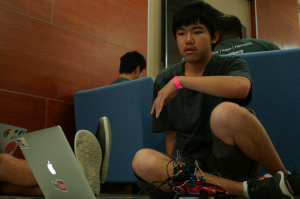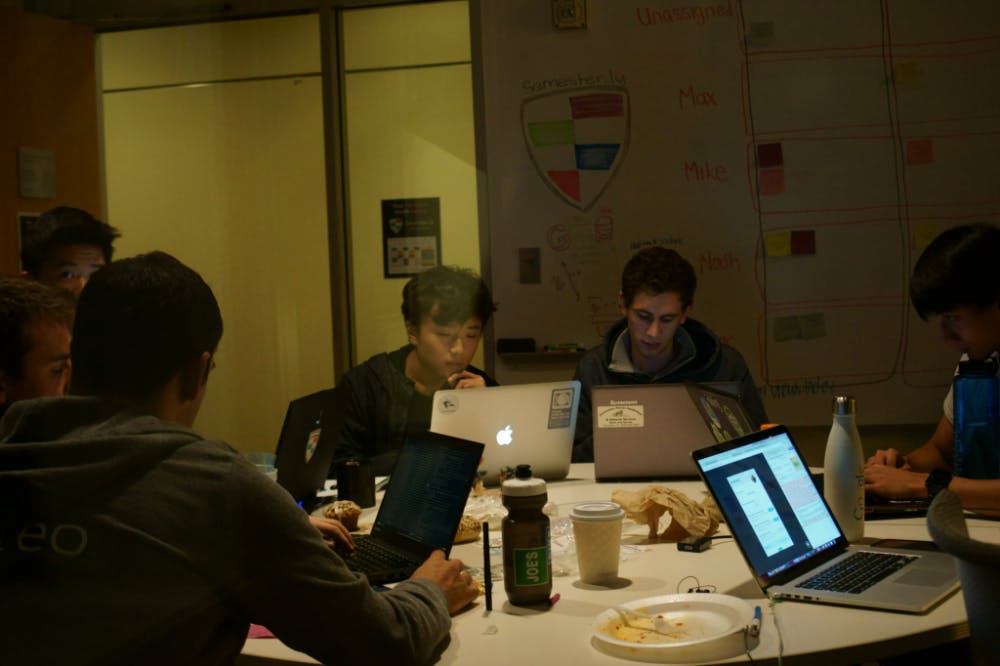Hopkins hosted the biannual hackathon, HopHacks, on Oct. 21. Twice a year, coders from all over the country arrive in Baltimore to compete in a 36-hour app building challenge. This year, HopHacks was co-hosted by Booz Allen Hamilton.
A total of 330 students participated in HopHacks this year. According to the HopHacks website, any university student, undergraduate or graduate, is eligible to participate. Coders compete in teams of four and all coding has to be original and done at the time of the competition.
HopHacks is a part of Major League Hacking (MLH), the official student hackathon league. According to their website, each year, MLH powers “over 200 weekend-long invention competitions that inspire innovation, cultivate communities and teach computer science skills to more than 65,000 students around the world.”
“HopHacks is a unique opportunity to get to experience a lot of people with computer science backgrounds but different skill sets come together,” sophomore Emma Adams said. “The computer science at Hopkins is great but it only offers one perspective. It’s great to get to work with people from all over and see how they think and to learn from them.”
Several technology companies, both on the local and national scale, send employees to mentor the students.
The HopHacks judges included Hopkins professors and local area tech professionals.
“When we were looking for judges, we focused on the Baltimore tech scene,” senior Christian Reotutar, one of the lead organizers, said. “We wanted to emphasize how much the local industry has flourished.”

This year’s judges included Peter Fröhlich, a Hopkins computer science professor, Margaret Roth, chief recruiting officer and co-founder of Yet Analytics and Michael Cohen, senior software engineer at the Johns Hopkins Medical Institutions Technology Innovation Center.
Sponsors also play a large role at HopHacks. This year, sponsors include Microsoft, Semester.ly, Johns Hopkins Technology Ventures and Mission Data. According to senior Michael Tershakovec, it can be difficult initially to find sponsors but, ultimately, big companies see hackathons as opportunities for recruitment.
Throughout the competition, the sponsors go around to the different teams and actively observe the students as they’re working.
“Just the fact that I got to talk to the sponsors one-on-one was incredibly helpful,” sophomore William Sun, who was a participant last year and an organizer this year, said. “I got an interview at one of the sponsor companies because of the rapport we built last year at HopHacks.”
Teams began working at 9 p.m. on Friday night and continued working until Sunday morning. Throughout the weekend, sponsors offered a workshop for the competitors to hone their hacking and business skills.
HopHacks culminates in a big science-fair-like round where each team is assigned a spot and judges. Sponsors and peers can come around the room and view the various demonstrations.
The top 10 teams then have four minutes each to present once again to the judges. Judges made their decisions based on criteria like how polished a product and its code looked, how the product fulfilled its intended purpose and how advanced the design and execution was.
Prizes were awarded to the first, second and third place teams. The team with the highest overall score won $1,024, the team with the second highest received $512 and the team with the third highest received $256.
Individual sponsors also awarded prizes to the teams. Booz Allen Hamilton awarded the Biggest Game Changer award to the project that could have the most potential to disrupt existing industries. Each team member received a $250 Amazon gift card. Mission: Data was looking for the Best User Experience and Johns Hopkins Technology Ventures was looking to award the Best Health Hack.
A total of $5,092 in prizes was offered this year.
Tamer Bader, Andy Sebastian, Zack Khan and Travis Ho came in first place overall with their project Code RC Car, an Android app that allows younger children to program a remote controlled car and learn the important fundamentals of basic coding in a fun and interactive way. The team’s goal is to get more people into coding at a younger age.
In second place was Koala — A Real-Time Conversation Translator created by Michael Mudgett, William Yao, Gary Qian and Aurik Sarker. Koala helps foster communication by allowing two users to choose their respective languages and then translating the spoken word from the first user’s language into text of the second user’s language.
Xinyu Huang, Zhiyi Ren, Xiaowei Wang and Minwei Xu came in third place with Orgo Savior, an app that could help students understand molecular structures learned in organic chemistry. The app projects 3D models that can be rotated after a molecular formula is scanned.
“It was incredible to see what all the teams were able to put together over the 36 hours and I was equally astounded when my team won second place,” Mudgett wrote in an email to The News-Letter. “Our application allows two people to who speak different languages to hold a conversation. It uses Google technology to transcribe audio recordings and translate them into a chosen language.”
Overall, students praised the hackathon.
“For me, hacking is coming up with a proof of concept on an idea that I’ve had, it doesn’t have to be perfect but it’s a start,” sophomore Andrew Wong, another organizer, wrote in an email to The News-Letter. “I was drawn to the Hackathon culture last year when I participated in HopHacks Fall 2015 — it ended up being so much fun spending a weekend with my friends creating a tangible product.”





